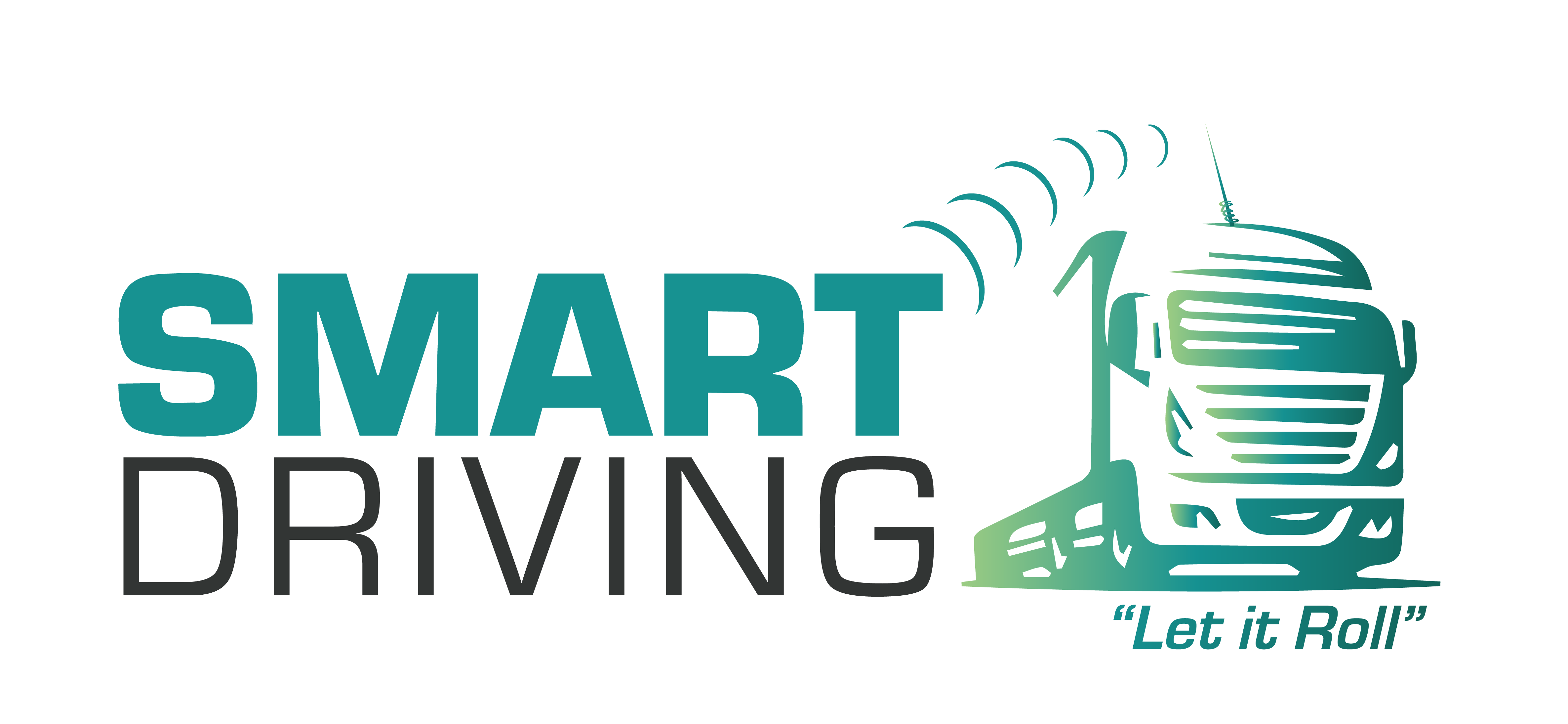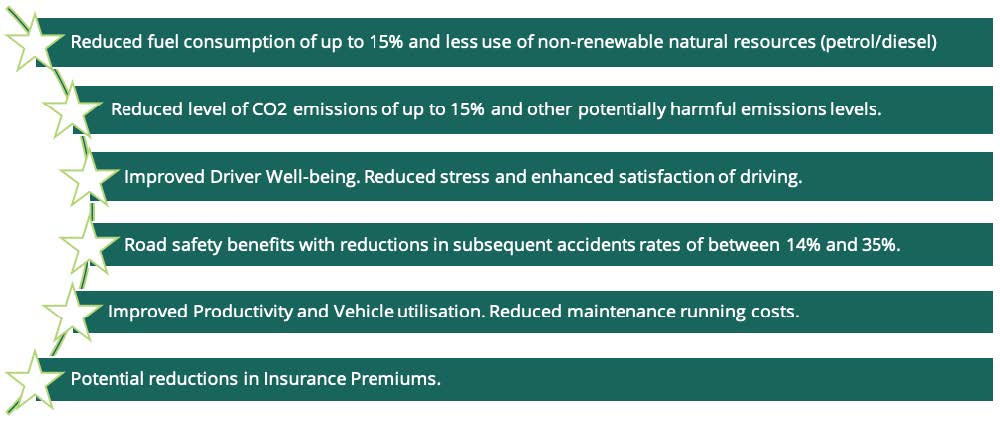
Executive Summary
SMART Driving Training Programme for Heavy Goods Vehicle Drivers
The research report highlights potential economic, environmental and road safety benefits arising from the SMART Driving upskilling programme. It outlines key digital advances that are impacting on everyday HGV driver experience. SMART Driving is a series of eco-driving behaviours which along with the adoption of new truck safety and efficiency technologies has the potential to lower CO2 emissions, reduce fuel usage, increase productivity and improve driver and road user safety.
The SMART DRIVING upskilling programme is an innovative initiative by Mayo, Sligo, and Leitrim ETB in collaboration with Waterford and Wexford ETB in partnership with the Irish Road Haulage Association. It is an exemplar of the approach being taken by ETBs within the new 5-year Further Education and Training (FET) strategy to act as a key resource for enterprise helping them address critical skills gaps and providing employees with upskilling opportunities to sustain their employment.
The Irish Road Haulage sector comprises many small operators with limited capacity to identify skills needs or to meet their employee development needs. Half of HGV Drivers have lower secondary level education as their highest level of educational attainment compared to 13% for all those at work.3
The average age of HGV drivers is relatively high4 with 28% aged over 55 years compared to the 19% national average. The skills need of the professional HGV drivers are rapidly changing driven by advances in vehicle digital technology, targets to reduce CO2 emissions, demand for greater efficiency, changing work practices, and mandatory regulatory requirements. The upskilling of HGV drivers is essential to keep up with new skills and knowledge demands. ETBs have identified this critical skills gap and are addressing it through the development of this targeted SMART Driving upskilling programme. The programme is being offered free to employers and is funded through the SOLAS “Innovation through Collaboration” Fund.
The SMART DRIVING upskilling programme is well aligned with the SOLAS workforce upskilling agenda, and Government priorities for reducing CO2 emissions, embracing innovation and technological change, and supporting regional development. The programme is a valuable contribution by FET within the National Strategy on Education for Sustainable Development in Ireland.
There is potential for the programme to be mainstreamed across the entire FET sector making it more widely available to existing professional HGV drivers, including HGV drivers returning to the sector and to participants on HGV traineeships and for professional drivers in other sectors.
The Irish Road Haulage sector provides employment for around 50,000 employees including 25,000 HGV drivers. 159 million tonnes of Irish freight per annum is transported by road including the safe and efficient transportation of food, goods, medicines, fuel, and pharmaceuticals so essential during the COVID-19 pandemic. HGV drivers may work locally, nationally, or long journey. Some work with hazardous or extremely large loads and require extra training and/or licences. Others work transporting livestock, or with refrigerated container loads. The COVID-19 pandemic requires more stringent hygiene and sanitisation guidance and practices for drivers. Following the recent EU-UK Trade and Cooperation Agreement, HGV professional drivers will have an important role to play in ensuring the smooth flow of Irish trade with the UK and EU.
SMART DRIVING is a strategy that can enhance driver performance, increase fuel efficiency, lower carbon emissions, and improve road safety. It comprises a series of eco-driving behaviours which uses advances in digital technology (In-cab and hand-held devices etc), to deliver immediate benefits for the employer, driver, and the environment. Evidence from Europe, Asia, and North America suggests that eco-driving behaviour that utilises the adoption of technical vehicle improvements, can save fuel and reduce emissions up to 15%. Fuel costs are a significant expense, accounting for about 30% to 40% of the total operating costs.5
Potential Benefits of SMART DRIVING

Advances in vehicle feedback systems can reinforce eco-driving behaviours including to assess drivers’ fuel efficiency performance, speed, gear changes, braking profile along with real-time advice while driving.6 SMART DRIVING training is a cost-effective means of reducing fuel usage and CO2 emissions in Road Freight.7 Improved driver performance from the programme can result in potential economic benefits as follows:
- Average annual fuel cost per Fleet Vehicle Ireland = €32,2508
- Cost savings Per Fleet Vehicle from 10% fuel usage reduction= €3,250
- Average annual maintenance cost per Fleet Vehicle Ireland = €7,500
- Cost savings Per Fleet Vehicle from 10% maintenance cost reduction = €750
- Potential Annual Fuel and Maintenance Savings Per Fleet Vehicle = €4,000
- Per 300 HGV Drivers undertaking SMART DRIVING Programme = €1,200,000
- Potential Reductions in CO2 emissions will contribute towards the Government Climate Change objectives. 9
- Per Fleet Vehicle from 10% fuel usage reduction = 10 tons
- Per 300 HGV Drivers SMART Driving Programme= 3,000 tons
(There are also commensurate improvements in local air quality from reduced micro-particles and nitrogen oxides).
SMART DRIVING can also contribute to the health and safety culture within an organisation.10 HGV Drivers can develop skills that promote their safety and other road users.11 There is evidence of road safety benefits arising from SMART DRIVING with reductions in subsequent accidents rates of between 14% and 35%.12
A differentiated learning approach will benefit those drivers with less digital skills capability. Small-sized Fleet Operators may also lack knowledge of vehicle digitalisation trends, as indicated in the survey work undertaken for this study and therefore the benefits of applying them. The SMART DRIVING promotional campaign with industry support and dedicated website will be essential to communicate the practical benefits of the programme and securing employers and drivers participation.
3 Heavy Goods Vehicles Drivers, Highest level of Education attained, CSO Census 2016, Profile 11 – Employment Occupations and Industry. https://statbank.cso.ie/px/pxeirestat/Statire/SelectVarVal/Define.asp?maintable=EB054&PLanguage=0
4 CSO 2016 Average Age by Occupational analysis. https://statbank.cso.ie/px/pxeirestat/Statire/SelectVarVal/Define.asp?maintable=EB068&PLanguage=0
5 Reducing the Carbon Footprint of Freight Movement through Eco-Driving Programs for Heavy-Duty Trucks, National Center for Sustainable Transportation, Center for Environmental Research and Technology University of California, 2015.
https://merritt.cdlib.org/d/ark:%252F13030%252Fm54b5rqg/1/producer%252FNCST201506.pdf
6 Assessment of the potential for demand-side fuel savings in the Heavy Goods Vehicle sector. The Centre for Sustainable Road Freight, UK, 2015. http://www.csrf.ac.uk/wp-content/uploads/2018/08/CUED-C-SRF_TR_108-Greening.pdf
7 Ibid
8 Derived from Data within Managers Guide to Freight Distribution Costs 2019, Freight Transport Association.
9 Utilising Road Haulage Operator data for driver’s mileage, fuel usage and CO2 emissions, February 2020.
10 https://www.cieca.eu/sites/default/files/documents/projects_and_studies/ECOWILL_FINAL_REPORT.pdf
11 Eco-driving for HGVs -Final Report, UK Department Transport, December 2016. https://www.fors-online.org.uk/cms/wp-content/uploads/2017/02/Eco-driving-for-HGVs.pdf
12 Efficient Driving-A rapid evidence assessment for the UK Department of Transport, 2016. https://assets.publishing.service.gov.uk/government/uploads/system/uploads/attachment_data/file/509972/efficient-driving-rapid-evidence-assessment.pdf
Testimonials
This programme will help the transport industry recruit new people into being a HGV driver and elevate this career into a choice that more young people might consider.
SMART Driving will help drivers deal with this new world while best availing of and utilising the new technologies and practises all around us. This upskilling programme will help drivers get a better understanding of their modern work environment and equipment, thus helping to create a safer and compliant delivery of service.
I look forward to both Driver's and Transport operators engaging with this upskilling opportunity, allowing for feedback from both inside and outside the cab, which can then feed into this course, helping it to evolve to meet an ever-changing landscape of technology and regulation.
What Are The Benefits?
Drivers
The SMART Driving programme will increase your level of professionalism and make you a bigger asset to your employer.
HGV drivers who enrol in the SMART Driving programme will get:
- Increased levels of professionalism
- Increased levels of employability
- Developed skills for promoting vehicle, driver, and load safety
- Increased confidence in vehicle control and driving performance
- Enhanced satisfaction of driving
- Reduced driver stress
Employers
Employers who enrol their HGV drivers in the SMART Driving programme will benefit from immediate and positive impacts on your business.
These include:
- Reduced fuel consumption
- Reduced operational costs
- Reduced fuel emissions
- Improved profit margins
- The increased resale value of your fleet
- Developed organisational health and safety culture
"Let it Roll"
EU Commission: Improvements in the aerodynamics of vehicles could save “approximately €5,000 per year in fuel costs for a typical long-distance lorry covering 100,000km”
Frequently Asked Questions
How do register for a SMART Driving programme?
Contact [email protected] for more information.
What are the benefits for employers?
Employers who enrol their HGV drivers in the SMART Driving programme will benefit from immediate and positive impacts to your business.
These include:
- Reduced fuel consumption
- Reduced operational costs
- Reduced fuel emissions
- Improved profit margins
- Increased resale value of your fleet
- Developed organisational health and safety culture
What are the benefits for drivers?
The SMART Driving programme will increase your level of professionalism and make you a bigger asset to your employer.
HGV drivers who enrol in the SMART Driving programme will get:
- Increased levels of professionalism
- Increased levels of employability
- Developed skills for promoting vehicle, driver, and load safety
- Increased confidence in vehicle control and driving performance
- Enhanced satisfaction of driving
- Reduced driver stress
How is this programme funded?
The SMART Driving programme is funded though the SOLAS ‘Innovation through Collaboration’ Fund.
Developed by Mayo Sligo Leitrim ETB (MSLETB), Waterford and Wexford ETB (WWETB) in collaboration with the Irish Road Haulage Association (IRHA), the Smart Driving programme supports the Government’s Future Jobs Ireland Programme 2020 objectives of:
Transitioning to a low carbon economy
Embracing technological change
Improving SME and workforce productivity





